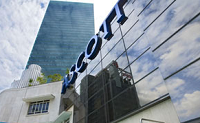
Train stations key to Ascott’s growth overseas
But Singapore still contributed 19% to Ascott's earnings this year.
DBS expects Ascott to deliver a DPU growth of 8%, driven from its turnaround in Asian operations.
Here's more from DBS:
| It’s all about location. In our recent site visit to selected Ascott REIT’s serviced residences or "apart’ hotels" in Paris/London, we note a distinct feature - properties are strategically positioned in key business districts or major tourist attractions in London and Paris with good access to public transportation. Most properties are within walking distance to the Metro in Paris and The Tube in London. Hence, these apart’ hotels attract a sustainable flow of guests – we understand that the Paris/London properties enjoy a healthy annual occupancy rate of between 75-85%. Upgrading works at selected properties to underpin stronger operational performance. Ascott REIT has embarked on a refurbishment exercise for its European portfolio. We visited selected properties in Paris/London, which are currently undergoing renovation. We understand that Ascott REIT will be able to fetch average room rates in excess of 20% higher when the newly renovated rooms are re-opened, impressive given the competitive landscape in London/Paris. The manager targets an average payback period of 4-5 years on renovation capex spent in London. DPU Growth of 8% expected. We project Ascott REIT to deliver a DPU growth of 8% in 2011, one of the strongest amongst its S-REIT peers. Growth is expected to continue to be driven from a turnaround in its Asian operations, led by Singapore, contributing c19% of EBITDA in 2011, while London properties, 29% of European EBITDA and 12% of EBITDA on a portfolio basis are poised to be the strongest performer after its planned refurbishment exercise towards the run-up of the London Olympics in 2012, on top of a projected +2% adjustment in master leases in FY11. BUY, DCF-based TP of S$1.38 maintained. Ascott REIT continues to offer an attractive above sector average FY11-12F yield of c7.0%-7.1%, which is unwarranted in our view, given its capable management track record, sponsor links and a portfolio of largely freehold properties. There is potential for further earnings upside if the manager executes on acquisitions. -they put in place to deal with these traits. It shows that “emotional” trading can cost investors nearly 20% in returns over a ten-year period, and the report Greg Davies, Head of Behavioural Finance at Barclays Wealth says: “Many people will be surprised to Most Singaporean HNWIs adopt a cautious approach to investing, with 61% of respondents saying they are more concerned with preventing bad things happening than ensuring that good things happen. The report also shows that investors in Singapore use many types of strategies to control their financial This approach can be attributed to Singaporean HNWIs wanting to ensure wealth for future generations, as highlighted in the twelfth volume of the Barclays Wealth Insights series The Age Illusion. This found that 73% of Singaporean HNWIs felt financially responsible for their children – the highest in Asia-Pacific. Brooks of Barclays Wealth adds: “These findings reflect the fact that Singaporean HNWIs may let their “In many cases, it may in fact not only help them pass on wealth for their future generations, but possibly grow their wealth by providing alternative investment options that are aligned to their personality dimensions. It is important for local investors to recognise this as they seek to make objective investment decisions. This is where financial institutions can come in and provide an alternative perspective.” |
























 Advertise
Advertise









